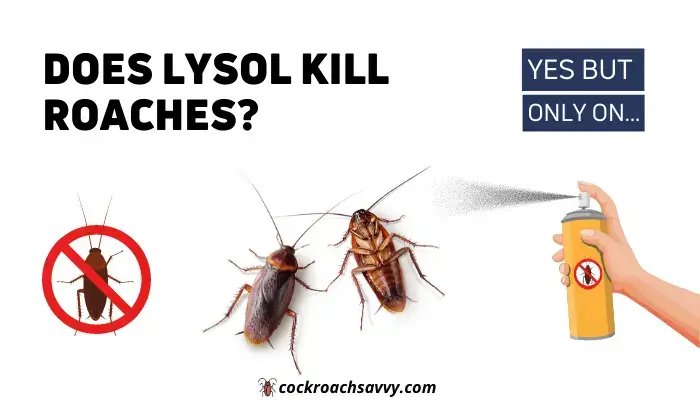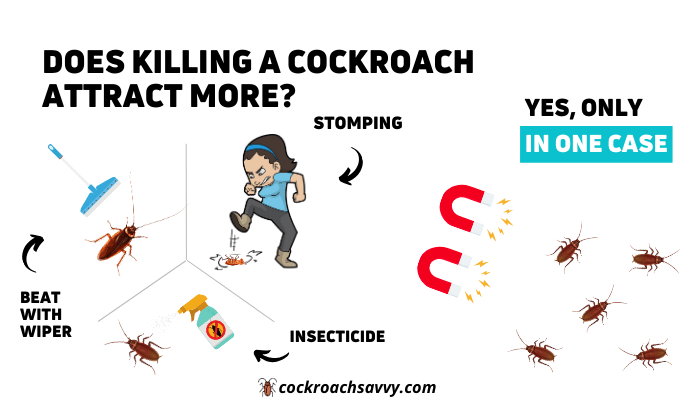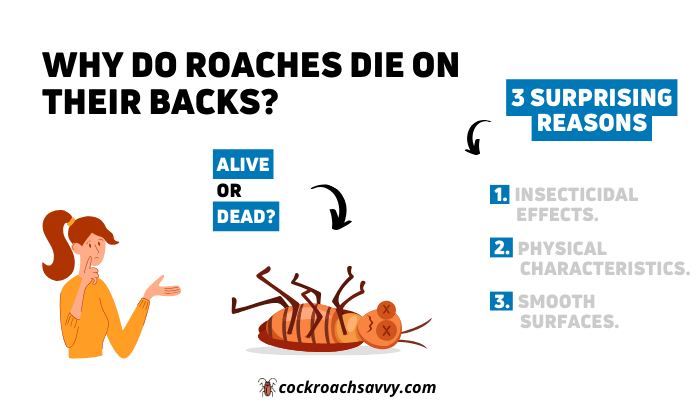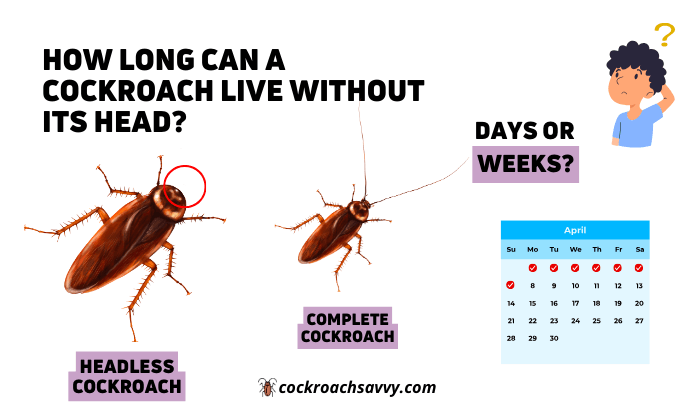Almost everyone has cockroaches in their homes – Some people are aware of their presence and some are not.
Let’s say you have seen a cockroach wandering in your home. And now you are looking for a solution that can eliminate them with minimal or no side effects.
I know how frustrating it can be for someone dealing with roaches for the first time without prior experience.
Fortunately, there are many effective solutions available out there to get rid of roaches, but many people aren’t aware of them, such as peppermint oil, boric acid, and Lysol.
Today, we will be digging deep into Lysol disinfectant spray.
For those of you who don’t know what is Lysol – Here is a short intro…
“Lysol is a brand that makes cleaning and disinfecting products containing active ingredients that can kill cockroaches on contact, making it an effective solution for roach control”
In this article, we will take a closer look at how Lysol works against roaches, why they cannot survive its active ingredients, and much more.
So, let’s start killing those roaches and get your home pest-free once and for all!
Does Lysol kill cockroaches?
Yes, Lysol can kill roaches, but it only works when applied directly to them or when they come in contact with it.
The active ingredients in Lysol clog the respiratory openings on the cockroach’s body, suffocating them to death.
Now, we know that Lysol can actually kill roaches let’s explore how Lysol accomplishes this.
Before going further, if you don’t have Lysol disinfectant spray and need one, you can buy it here on Amazon
The above link is an affiliate link, which means if you make a purchase through this link, I will earn a small commission from qualifying sales.
How Does Lysol Kill Roaches
To better understand how Lysol kills roaches. First, we need to understand how cockroaches breathe and what Lysol contains.
Just like other creatures, cockroaches do not breathe through their mouth and lungs. Instead, their respiration occurs through spiracles – small openings on the sides of their body, just like how plants breathe through stomata.
Lysol disinfectant spray does not have any insecticide properties, but it still kills roaches because it has active ingredients such as Benzalkonium Chloride, Alkyl, and ethanol, which cockroaches can’t survive.
When you spray Lysol disinfectant spray on roaches, either one of the following happens:
Lysol kills roaches in two ways…
Attacking their Nervous System:
Cockroaches can be killed by attacking their nervous system.
When we spray Lysol disinfectant spray on cockroaches, ethanol in Lysol penetrates the roach’s exoskeleton and attacks their nervous system, causing the roach to lose control of its muscles and ultimately die.
The second way is …
Blocking their Spiracles:
Lysol disinfectant spray can also kill roaches by physically blocking their spiracles, which are the small openings on their bodies through which they breathe.
When these openings are blocked, roaches suffocate and eventually die.
Lysol is primarily used for antisepsis due to its high percentage of alcohol, but it also contains Benzalkonium Chloride, a sticky substance that helps the spray adhere to surfaces.
When sprayed on roaches, Lysol can either directly block their spiracles or stick to their wings and legs, ultimately leading to their demise.
In either case, the roach will not be able to breathe and will eventually die.
Ok – Before digging more into the topic you should know When Lysol Can Be Effective Against Roaches. If these are the cases you need a solution for then continue reading.
When Lysol Can Be Effective Against Roaches
While Lysol may not be the best solution for eliminating an infestation, there are certain situations where it can be effective against roaches. These include:
Killing a single roach:
If you spot a single roach in your home, spraying it with Lysol can be a quick and easy way to kill it.
For example, if you were about to sleep and you saw a cockroach wandering in your room – Lysol is your solution.
Cleaning up after roach activity:
If you see signs of roach activity, such as droppings or egg cases, using Lysol to clean the area can help to prevent future infestations.
Preventing future infestations:
Using Lysol regularly on surfaces can help to deter roaches from coming into your home in the first place.
Lysol vs Insecticides for Roaches: Which is Best?
The debate over whether to use Lysol or insecticides for roaches is an important one.
While both options have their advantages and disadvantages, it ultimately comes down to personal preference and the severity of the roach infestation.
Lysol:
Lysol is a great option for killing roaches when you don’t want to use harmful chemicals that could be dangerous to pets or children in your home.
However, Lysol is only effective for small roach infestations that are easily countable.
Insecticides:
Insecticides, on the other hand, can be highly effective but come with potential health risks and environmental concerns.
If you have a large and severe roach infestation, insecticides may be the best option for complete eradication.
What would I Use
Ultimately, it’s important to weigh the pros and cons of each option and choose the one that best fits your needs and preferences.
For example, if I have to choose between Lysol and Insecticides, my decision would depend on the severity of the roach infestation.
If I can count the number of roaches and they are manageable, I would prefer using Lysol.
However, if the infestation is severe and the roaches are uncountable, then I would opt for insecticides as they are more effective in such situations.
Things to Keep in Mind Before Using Lysol for Roaches
Before using Lysol to kill roaches, there are a few things you should keep in mind:
| 1. | Check the label to ensure that Lysol contains active ingredients such as Benzalkonium Chloride, Alkyl, and ethanol |
| 2. | Don’t touch your face, eyes, or mouth after using Lysol. |
| 3. | You should never intentionally inhale excessive amounts of Lysol. |
| 4. | Wash your hands immediately after using Lysol. |
| 5. | Don’t use Lysol in areas where pets and children are present. First, move them to another place and then use Lysol. |
By keeping these things in mind, you can use Lysol safely and effectively to help control roaches in your home.
Now, we know all the necessary basics, lets explore how to effectively use lysol spray against roaches.
How to use Lysol spray?
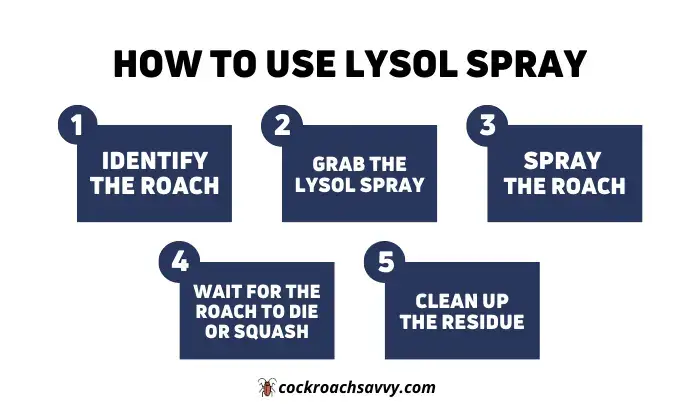
If you’ve decided to use Lysol to kill roaches, there are a few things you should keep in mind to ensure that you’re using it effectively and safely:
Here is a step-by-step method on how to use Lysol spray to kill roaches:
- Identify the roach:
Locate the roach and make sure it is within reach of the spray.
- Grab the Lysol spray:
Shake the Lysol spray bottle to activate the ingredients and then hold it approximately 18 inches away from the roach.
- Spray the roach:
Aim the spray directly at the roach and spray it thoroughly, targeting the head and thorax area for maximum effect. Make sure the Lysol comes into direct contact with the roach.
- Wait for the roach to die:
After spraying the roach with Lysol, allow it to sit for a few minutes until it is dead. This should only take a few minutes, as Lysol can kill roaches almost instantly.
- Clean up the residue:
Use a paper towel to clean up any remaining residue and discard it in the trash.
It’s important to note that Lysol can be harmful to humans and pets if ingested or inhaled in large quantities, so use it with caution.
How to make Lysol spray?
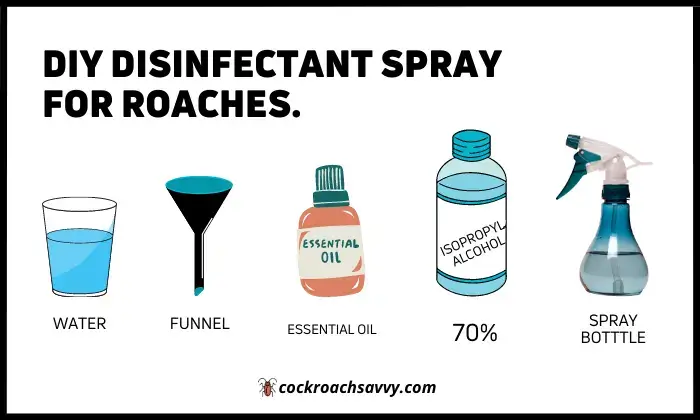
Lysol is a ready-made commercial disinfectant spray that can help to kill germs and bacteria on surfaces in your home.
While you cannot make Lysol spray at home, you can make your own DIY disinfectant spray that can be effective against roaches and other pests.
Here’s how to do:
Materials:
- Spray bottle
- Isopropyl alcohol (70% or higher)
- Water
- Essential oils (optional)
- Funnel (optional)
Instructions:
- Start by filling your spray bottle about three-quarters of the way full with water.
- Add isopropyl alcohol to the spray bottle until it is almost full.
- If you want to add a scent to your spray, you can add a few drops of essential oil to the mixture.
- Screw on the spray bottle lid and give the mixture a good shake to combine the ingredients.
- Label the spray bottle with the contents and date of creation.
Your DIY disinfectant spray is now ready to use!
To use it as a roach killer,
Simply spray the roach directly with the mixture.
And same as Lysol aim for the head and thorax area, as this will have the greatest effect on the roach.
As this DIY disinfectant spray can be effective at killing roaches, it is not as powerful as commercial products like Lysol.
Before wrapping up the article lets have some pros & cons of Lysol for roaches
Pros and Cons of Using Lysol for Cockroaches
Lysol is indeed an effective solution for killing individual roaches, but it’s also important to know the pros and cons before using it:
Pros:
- Lysol is readily & easily available and can be purchased from grocery stores, supermarkets, and online retailers.
- Lysol is a disinfectant spray that can help to kill germs and bacteria on surfaces, in addition to killing roaches.
- Lysol can be used as a preventative measure to help keep roaches from returning.
Cons:
- Lysol is not the best solution in case of eliminating a larger roach infestation.
- Lysol can be harmful to humans and pets if ingested or inhaled in large quantities, so it must be used with caution.
Wrapping Up:
In the end, all I have to say is Lysol disinfectant spray is a great product not only for cleaning surfaces from gems but also for cockroaches (Except the one CON – that you have to apply it directly on roaches. Otherwise it won’t work).
Take necessary precautions when using Lysol to ensure the safety of pets and humans.
By following the tips and guidelines mentioned in this article, you can effectively control roaches in your home and maintain a safe and healthy living environment.
Hope this Article Helped You.
Buy Lysol disinfectant spray on Amazon.
The above link is an affiliate link, which means if you make a purchase through this link, I will earn a small commission from qualifying sales.
FAQS
How long does it take for Lysol to kill roaches?
There is no definitive answer to this question, as it depends on various factors such as the amount of Lysol applied, the size of the cockroach, and the environmental conditions.
However, in general, it can take anywhere from a few minutes to a few hours for Lysol to kill roaches.
It’s important to note that even if the roach appears dead, it may still be alive, and it’s recommended to dispose of it properly.
Why can’t roaches survive Lysol?
Cockroaches can’t survive Lysol due to the open pores on their bodies for breathing and the presence of Benzalkonium Chloride and ethanol in Lysol, which kill them by suffocating or attacking their nervous system.
Is Lysol safe for pets?
Lysol is harmful to pets if they inhale or ingest it, due to the presence of active ingredient phenol in it.
Phenol is particularly dangerous for cats but can also pose a risk to dogs.
Cats can absorb phenol through the air, their skin, or by licking contaminated surfaces.
As cats are unable to metabolize phenol, exposure can result in liver failure and other health issues.
To prevent this, it is important to keep pets out of the area when using Lysol and to follow the instructions on the label carefully.
Can Lysol be used to eliminate a roach infestation?
While Lysol can be effective at killing individual roaches, it’s not the best solution for eliminating a larger infestation. Consider using other methods, such as baits or traps, for a larger problem.

